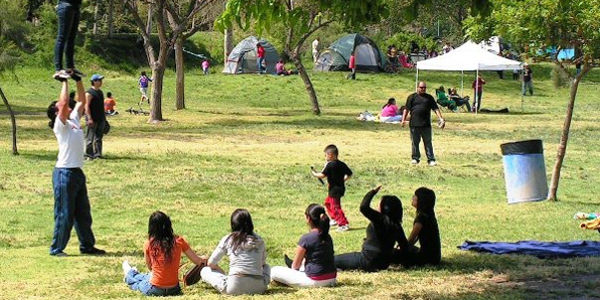AFFIRMATIVES AND NEGATIVES IN SPANISH
- Home
- AFFIRMATIVES AND NEGATIVES IN SPANISH
Beginner Spanish Grammar Lesson
Palabras Affirmativas y Negativas en Español

Libros en la biblioteca
In these notes you will learn more about negative and affirmative words used in Spanish; including indefinite pronouns to mean nobody, nothing, someone, something, and many more. Read the explanations and the example sentences carefully to be ready to complete the exercises below to practice and to test yourself.
When we want to talk about an indefinite situation we use an affirmative word.
When we want to talk about a negative situation we use a negative word.
| PALABRAS AFIRMATIVAS | PALABRAS NEGATIVAS |
|---|---|
| algo - something | nada - nothing |
| alguien - someone | nadie - nobody |
| alguno/a/as, algún - a, one, any, some | ningún, ninguno/a - none |
| siempre - always | nunca, jamás - never |
| alguna vez - ever | nunca, jamás - never |
| también - also | tampoco - neither |
| o … o, either … or | ni … ni - neither … nor |
Alguno and ninguno must match the gender and number of the noun they replace or modify.
Note that alguno changes to algún when used before masculine singular nouns.
Similarly, ninguno changes to ningún when used before masculine singular nouns.
- Alguno de ellos. (One of them.)
- Algunos de los muchachos. (Some of the boys.)
- Algunos hombres están lavando el coche. (Some men are washing the car.)
- Algunas mujeres están lavando el coche. (Some women are washing the car.)
- Algún libro se perdió en la biblioteca. (A book was lost in the library.)
- Algún niño se perdió en el parque. (A boy was lost in the park.)
- No hay ningún libro en la mesa. (There is no book on the table.)
Note that if you are including the masculine noun you will use the words algún or ningún. If you are not including the masculine noun because it is already known, it was already mentioned, etc, you use the form alguno and ninguno.
- ¿Están todos los libros en la biblioteca? No, alguno se perdió.
- (Are all the books in the library? No, one was lost.)
- ¿Están todos los niños listos? No, ninguno está listo.
- (Are all the children ready? No, none of them is ready.)
If a verb is preceded by "no" then any words that follow must be negative. A double negative is required in Spanish when "no" precedes the verb:
- No tenemos nada - We don’t have anything. [Literally: we don't have nothing.]
- No me gusta ninguna blusa - I don’t like any blouse.
However, if the negative word comes before the verb, we don't need to use "no".
- Yo nunca veo películas de terror - I never watch horror movies.
- Nadie vio esa película porque era horrible - Nobody watched that movie because it was horrible.
Exercise 1: Look at the pictures and answer the questions with suitable words.
Ejercicio 1: Mira las fotos y responde las preguntas con las siguientes palabras.
Hints: ningún (x2), algunas, algunos, ninguna, siempre, nadie (x3).
Note: Try to use the correct written accents if you can e.g.: á, é, í, ó, ú, ñ, ü.
If you don't know the correct answer, type '?' to reveal it.

1. ¿Hay alguna persona en el mar? - Sí hay
 personas.
personas.
2. ¿Hay algún tiburón en el mar? - No, no hay
 tiburón en el mar.
tiburón en el mar.
3. ¿Hay mucha gente en el verano? -
 hay mucha gente en el verano.
hay mucha gente en el verano.

4. ¿Hay alguien en la playa? - No, no hay
 en la playa.
en la playa.
5. ¿Algunas personas juegan en el mar? - No,
 juega en el mar.
juega en el mar.

6. Me parece que no hay
 joven en este parque.
joven en este parque.
7. Sí, hay
 jóvenes en el parque. ¡Mira!
jóvenes en el parque. ¡Mira!
8.
 mujer está usando vestido.
mujer está usando vestido.
9. ¿Alguien está comiendo? - No,
 está comiendo.
está comiendo.
Exercise 2: Classify these words as affirmative or negative.
Ejercicio 2: Clasifica estas palabras como positivas o negativas
Exercise 3: Complete the Spanish sentence to mean the same as the English.
Ejercicio 3: Lee las oraciones en inglés y completa las que están en español para que tengan el mismo significado.
Hints: alguien, alguno, algún, algunos, nada, nadie, no, nunca, siempre, tambien, tampoco
Note: Try to use the correct written accents if you can e.g.: á, é, í, ó, ú, ñ, ü.
If you don't know the correct answer, type '?' to reveal it.

1. I do not have anything in my backpack. - No tengo
 en mi mochila.
en mi mochila.
2. I always eat spaghetti. - Yo
 como spaghetti.
como spaghetti.
3. I never drive a Ferrari. - Yo
 conduzco un Ferrari.
conduzco un Ferrari.
4. Nobody is dancing. -
 está bailando.
está bailando.
5. Someone is knocking on the door. -
 está golpeando la puerta.
está golpeando la puerta.
6. I like ice-cream and I also like chocolate. Me gusta el helado y
 me gusta el chocolate.
me gusta el chocolate.
7. I have some books on the shelf. - Tengo
 libros en el estante.
libros en el estante.
8. I don’t have a blue car. -
 tengo un auto azul.
tengo un auto azul.
9. - Me neither. - Yo
 .
.
Exercise 4: Choose the correct word.
Ejercicio 4: Elige la palabra correcta.

1. Visitaste alguna vez México? - No,
he visitado México.

2. ¿Hablas con tus amigos? - Sí,
hablo con mis amigos.

3. ¿Hay alguien que sepa hablar francés en la clase? - Sí, hay
que sabe hablar francés.

4. ¿
niño puede correr rápido?

5. No,
puede correr rápido.

6.
vino a la fiesta, fue muy aburrida.

7. Sí, y
para comer.

8. ¿No tienes los cuadernos? - No, y
tengo el diccionario.

9. ¿Vas a la escuela? - No,
voy a la escuela, voy a la universidad.

Exercise 5: Complete with a suitable word
Ejercicio 5: Completa con una palabra adecuada.
Hints: algún, alguno, algunos, alguien, ningún, ninguna, nada, nadie, nunca.
1. La clase de matemáticas es muy difícil, no comprendo
 .
.
2. Estoy asombrado,
 había visto a una mujer tan bonita.
había visto a una mujer tan bonita.
3. Estoy muy triste porque
 vino a mi fiesta.
vino a mi fiesta.
4. ¿Hay
 que pueda leer la mente?
que pueda leer la mente?
5. ¿Hay
 planeta llamado Capricornio?
planeta llamado Capricornio?
6. ¡No! ¡No hay
 planeta llamado Capricornio!
planeta llamado Capricornio!
7. No hay
 que pueda volar como Superman.
que pueda volar como Superman.
8. Asombrosamente,
 estudiante aprobó el examen porque no estudiaron.
estudiante aprobó el examen porque no estudiaron.
9.
 jóvenes quieren ir a la fiesta.
jóvenes quieren ir a la fiesta.
